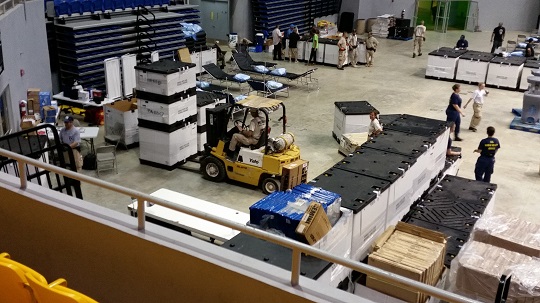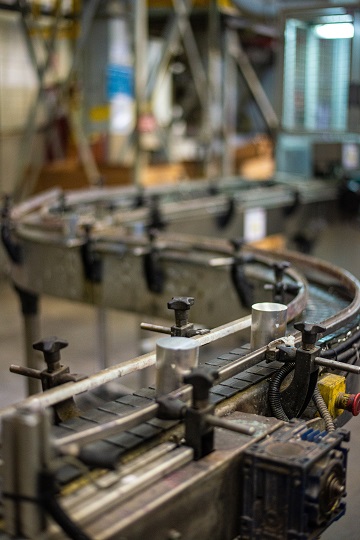In the realm of manufacturing, measuring your performance is essential for assessing the efficiency and effectiveness of your production processes.
However, relying solely on the total output quantity as a performance indicator falls short of providing you with a comprehensive understanding of your manufacturing system’s effectiveness.
To truly gauge your performance accurately, it is crucial for you to measure the accuracy of your output production SKU by SKU. This approach directly influences the precision with which your delivery team can dispatch products to your customers.
In this blog post, we will explore the significance of SKU-level accuracy in measuring your manufacturing performance and how it impacts your overall customer experience.
But before we delve deeper, make sure you have joined the scmguide telegram channel to receive notifications of the latest posts from this blog as well as more insights on supply chain management.
The Limitations of Total Output Quantity Measurement
When you evaluate your manufacturing performance based solely on the total output quantity, it poses certain limitations.
While this metric provides you with a general overview of your productivity, it falls short of offering insights into the quality and precision of your manufacturing process.
By solely focusing on quantity, you may overlook the crucial fact that each product variant or Stock Keeping Unit (SKU) within your manufacturing system may have unique specifications, features, or attributes.
Disregarding these distinctions can result in inaccurate assessments of your manufacturing system’s effectiveness.
For instance, if you produce a large quantity of products but fail to consider the individual specifications of each SKU, you might overlook potential errors or deviations from desired standards.
This oversight can compromise the overall quality of your products, negatively impacting customer satisfaction and the reputation of your brand.
Furthermore, customers often have specific requirements for certain SKUs, such as size, color, or functionality. If you do not measure the accuracy of output production SKU by SKU, you may inadvertently produce incorrect or mismatched products. This can lead to customer dissatisfaction, returns, and even lost business opportunities.

Measuring total output quantity alone also fails to account for variations in demand among different SKUs. Some SKUs may be more popular or have higher demand than others.
By not considering SKU-level accuracy, you may inaccurately assess the success of your manufacturing process. It is important to understand which SKUs contribute the most to your overall performance and identify areas for improvement.
To overcome these limitations, it is crucial for you to focus on measuring the accuracy of your output production SKU by SKU. This granular approach allows you to capture the nuances of each product variant and ensure that they meet the intended specifications.
By doing so, you can make more informed decisions about your manufacturing processes, identify potential areas for improvement, and enhance the overall customer experience.
Defining SKU-Level Accuracy
SKU-level accuracy is a concept that directly relates to your manufacturing system and the precision with which you produce each individual SKU.
It focuses on ensuring that the output of your manufacturing process aligns with the intended specifications for each product variant.
To achieve SKU-level accuracy, you need to track the quality, consistency, and conformity of your products SKU by SKU throughout the entire production process. This means paying attention to the specific attributes, features, and requirements of each SKU and ensuring that they are met consistently.
By adopting a granular approach to measuring SKU-level accuracy, you gain the ability to identify any discrepancies or deviations from the desired standards. This enables you to promptly take corrective actions and make necessary adjustments to your manufacturing processes.
For example, if a particular SKU consistently falls short of the desired specifications, you can investigate the root cause of the problem. It could be an issue with a specific machine, a material supplier, or an aspect of your production workflow.
By pinpointing the source of the deviation, you can implement corrective measures to rectify the problem and improve the accuracy of that SKU.

Measuring SKU-level accuracy empowers you to maintain consistent quality across your product range. It ensures that each SKU meets customer expectations and adheres to the intended standards. This not only enhances customer satisfaction but also strengthens your brand reputation as a reliable and trustworthy manufacturer.
Additionally, SKU-level accuracy allows you to identify trends or patterns in the accuracy of different SKUs. You can analyze which SKUs consistently meet the desired specifications and which ones may require further attention or improvement.
This insight enables you to prioritize resources and focus on enhancing the accuracy of SKUs that have the greatest impact on your manufacturing performance and customer satisfaction.
You might also like:
- Mastering Fluctuating Demand: Key Strategies for Manufacturing Success
- Develop Your Leadership: Unleash the Benefits of Delegation in Your Supply Chain Management
Impact on Timely Deliveries
The accuracy of SKU-level production has a direct impact on your ability to deliver products to your customers in a timely manner. When you manufacture each SKU with precision, it significantly reduces the likelihood of errors or mistakes during the order fulfillment process.
This, in turn, ensures that the correct products are readily available in the required quantities, eliminating the need for rework, replacements, or delays.
By focusing on SKU-level accuracy, you can avoid situations where incorrect or mismatched products are sent to customers. This minimizes the need for returns or exchanges, saving both time and resources.
When customers receive the exact products they ordered, it enhances their satisfaction and reinforces their trust in your brand.
Moreover, precise SKU-level production enables you to meet customer demand more effectively.
By accurately producing the required quantities of each SKU, you can minimize stockouts or shortages. This reduces the risk of delays in fulfilling customer orders and helps you maintain a competitive edge in the market.

Timely deliveries are crucial for customer satisfaction and retention. When customers receive their products promptly, it demonstrates your commitment to their needs and enhances their overall experience.
On the other hand, delays caused by inaccurate SKU-level production can lead to frustration and dissatisfaction among customers. They may perceive your brand as unreliable and seek alternative suppliers for their needs.
Inaccurate SKU-level production can also have a ripple effect on your supply chain. When products are not manufactured with precision, it can disrupt the entire logistics process, causing delays at various stages, such as warehousing, shipping, and delivery.
This can result in missed delivery deadlines, increased shipping costs, and strained relationships with logistics partners.
By prioritizing SKU-level accuracy, you can streamline your supply chain operations and optimize efficiency. Accurate production ensures that the right products are available at the right time, reducing the chances of bottlenecks or logistical challenges.
This enables you to fulfill orders promptly, meet customer expectations, and maintain a positive reputation in the marketplace.
On the other hand, if you compromise SKU-level accuracy, it can result in errors, mismatches, or incomplete orders.
For example, if you fail to produce a particular SKU accurately, it could lead to stockouts or backorders, causing delays in deliveries and ultimately disappointing your customers.
It is important to recognize that the accuracy of your manufacturing process at the SKU level directly affects the reliability and efficiency of your delivery team.
Enhancing Customer Satisfaction
Accurate SKU-level production plays a crucial role in enhancing your customers’ satisfaction. When you manufacture products with precision, customers receive exactly what they ordered, which fosters trust and confidence in your brand as a manufacturer.
On the contrary, when SKU-level accuracy is compromised, it can result in incorrect or defective products reaching your customers, leading to frustration, dissatisfaction, and potential damage to your reputation as a manufacturer.

When customers receive products that meet their exact specifications, it demonstrates your commitment to quality and attention to detail.
Accurate SKU-level production ensures that the products align with the features, attributes, and requirements outlined by your customers during the ordering process. This, in turn, cultivates a positive customer experience, as they feel their needs and preferences are respected and met.
Inaccurate SKU-level production, on the other hand, can have detrimental effects on customer satisfaction.
If customers receive products that do not match their expectations or have defects due to inaccuracies in manufacturing, it can result in frustration and disappointment. The customer may have to go through the inconvenience of returning the product, requesting a replacement, or seeking a refund, which negatively impacts their experience with your brand.
Furthermore, inaccurate SKU-level production can harm your reputation as a manufacturer.
Dissatisfied customers may share their negative experiences with others through word-of-mouth, online reviews, or social media platforms.
These negative reviews can tarnish your brand’s image and deter potential customers from choosing your products in the future. Conversely, accurate SKU-level production enhances your reputation as a reliable and trustworthy manufacturer, leading to positive word-of-mouth referrals and increased customer loyalty.
Consistency in SKU-level accuracy is also essential for customer satisfaction. When each SKU is manufactured consistently and meets the intended specifications, customers can rely on your brand to consistently deliver high-quality products.
Consistency builds trust and loyalty among your customer base, as they can confidently purchase products knowing they will receive the same level of quality and accuracy each time.
By prioritizing SKU-level accuracy, you are investing in customer satisfaction and loyalty. Customers who are satisfied with their purchase experience are more likely to become repeat customers, refer your brand to others, and become brand advocates.
This positive customer sentiment can contribute to long-term business growth and success.

Furthermore, you play a crucial role in maintaining consistency across product batches through SKU-level accuracy. If different SKUs within your product line have varying levels of accuracy, it can lead to inconsistencies in the customer experience.
Customers may observe differences in quality, performance, or appearance, which can erode their trust in your ability to deliver consistent products.
You might also like:
- Staying Ahead in the Fast-Paced FMCG Market: The Key Lies in Responsiveness
- Rescheduled Production Woes: Tackling Equipment Problems in Manufacturing
Improving Manufacturing Processes
Measuring SKU-level accuracy empowers you as a manufacturer to identify areas for improvement in your manufacturing processes.
By tracking the accuracy of each SKU and recognizing specific SKUs that consistently deviate from the desired standards, you can take proactive measures to enhance your operations.
Pinpointing areas of inaccuracy at the SKU level allows you to identify the root causes of deviations. It could be due to machine settings, human error, inadequate quality control measures, or inefficient workflows.
By understanding the underlying factors contributing to inaccuracies, you can implement targeted corrective actions.
For example, if a particular SKU consistently falls short of the desired specifications, you can evaluate the machinery settings involved in its production.
By fine-tuning the machine parameters or calibrating the equipment, you can ensure that future productions of that SKU adhere to the intended standards.
Optimizing workflows is another area where SKU-level accuracy measurement can lead to process improvements.
By analyzing the production steps and identifying potential bottlenecks or inefficiencies, you can streamline the workflow to enhance accuracy. This may involve reorganizing workstations, optimizing task sequences, or implementing automation technologies to reduce human error.
Enhancing quality control measures is vital for improving SKU-level accuracy. Implementing rigorous quality checks, inspections, and testing procedures at critical stages of production can help detect deviations early on.

This allows you to take immediate corrective actions before the production process progresses further, minimizing the likelihood of inaccurate SKUs reaching the customers.
Adopting a continuous improvement approach based on SKU-level accuracy measurements fosters a culture of innovation and efficiency within your manufacturing operations.
By constantly monitoring and evaluating SKU-level accuracy, you can identify trends, patterns, and recurring issues. This data-driven approach enables you to make informed decisions and prioritize improvement efforts.
As you refine your manufacturing processes to improve SKU-level accuracy, you will witness the benefits of increased operational efficiency.
Higher accuracy leads to reduced rework, fewer product defects, and decreased waste. This, in turn, translates to cost savings, improved productivity, and shorter lead times, enhancing your overall competitiveness in the market.
Conclusion
In conclusion, you must recognize that relying solely on total output quantity as a measure of manufacturing performance falls short in providing a comprehensive assessment of your production system.
Measuring SKU-level accuracy is essential for evaluating your manufacturing effectiveness and ensuring the precision with which products are delivered to your customers.
SKU-level accuracy directly influences the reliability of your delivery team, customer satisfaction, and overall brand reputation.
By prioritizing the accuracy of each SKU produced, you can identify and address any deviations from the desired standards, leading to improved manufacturing processes and enhanced customer experiences.
Therefore, in your pursuit of manufacturing excellence, it is crucial to acknowledge the significance of SKU-level accuracy as a key performance metric.
Hope it is useful!
Please also share this article with your colleagues so that they can benefit from it as well. Join our scmguide telegram channel to receive notifications of the latest posts from this blog and gain more insights into supply chain management. All articles on this blog are free for you to use for any purpose, including commercial, without the need for attribution.

 by
by 

